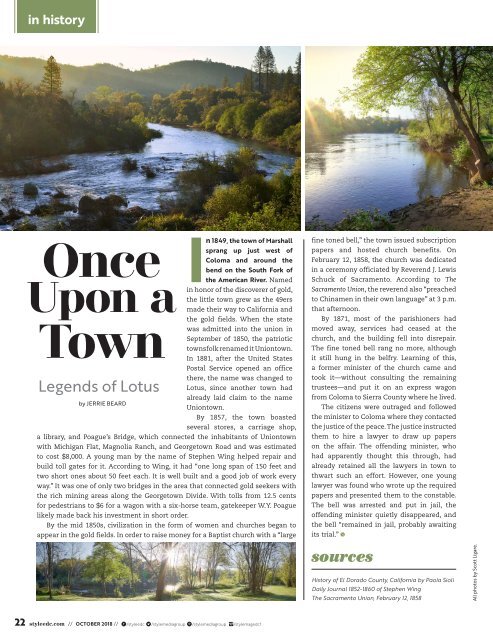Style El Dorado County and Foothills; October 2018
In this year’s Readers’ Choice Awards contest, we had more voters than ever (90,000+ to be exact). Starting on page 26, read all about the top dogs—whose goods and services run the gamut from food to finance—and let it be a reminder of just how many reputable businesses our region boasts. There’s plenty more in the pages that follow, including “8 Ways to Reduce Your Breast Cancer Risk” on page 18, a roundup of local ways to celebrate Halloween on page 10, and an easy-to-follow itinerary for “A Perfect Day in Apple Hill” on page 8. Enjoy the issue and remember to congratulate and support some of the winners mentioned in this month’s mag. Cheers!
In this year’s Readers’ Choice Awards contest, we had more voters than ever (90,000+ to be exact). Starting on page 26, read all about the top dogs—whose goods and services run the gamut from food to finance—and let it be a reminder of just how many reputable businesses our region boasts.
There’s plenty more in the pages that follow, including “8 Ways to Reduce Your Breast Cancer Risk” on page 18, a roundup of local ways to celebrate Halloween on page 10, and an easy-to-follow itinerary for “A Perfect Day in Apple Hill” on page 8.
Enjoy the issue and remember to congratulate and support some of the winners mentioned in this month’s mag. Cheers!
Create successful ePaper yourself
Turn your PDF publications into a flip-book with our unique Google optimized e-Paper software.
in history<br />
Once<br />
Upon a<br />
Town<br />
Legends of Lotus<br />
by JERRIE BEARD<br />
In 1849, the town of Marshall<br />
sprang up just west of<br />
Coloma <strong>and</strong> around the<br />
bend on the South Fork of<br />
the American River. Named<br />
in honor of the discoverer of gold,<br />
the little town grew as the 49ers<br />
made their way to California <strong>and</strong><br />
the gold fields. When the state<br />
was admitted into the union in<br />
September of 1850, the patriotic<br />
townsfolk renamed it Uniontown.<br />
In 1881, after the United States<br />
Postal Service opened an office<br />
there, the name was changed to<br />
Lotus, since another town had<br />
already laid claim to the name<br />
Uniontown.<br />
By 1857, the town boasted<br />
several stores, a carriage shop,<br />
a library, <strong>and</strong> Poague’s Bridge, which connected the inhabitants of Uniontown<br />
with Michigan Flat, Magnolia Ranch, <strong>and</strong> Georgetown Road <strong>and</strong> was estimated<br />
to cost $8,000. A young man by the name of Stephen Wing helped repair <strong>and</strong><br />
build toll gates for it. According to Wing, it had “one long span of 150 feet <strong>and</strong><br />
two short ones about 50 feet each. It is well built <strong>and</strong> a good job of work every<br />
way.” It was one of only two bridges in the area that connected gold seekers with<br />
the rich mining areas along the Georgetown Divide. With tolls from 12.5 cents<br />
for pedestrians to $6 for a wagon with a six-horse team, gatekeeper W.Y. Poague<br />
likely made back his investment in short order.<br />
By the mid 1850s, civilization in the form of women <strong>and</strong> churches began to<br />
appear in the gold fields. In order to raise money for a Baptist church with a “large<br />
fine toned bell,” the town issued subscription<br />
papers <strong>and</strong> hosted church benefits. On<br />
February 12, 1858, the church was dedicated<br />
in a ceremony officiated by Reverend J. Lewis<br />
Schuck of Sacramento. According to The<br />
Sacramento Union, the reverend also “preached<br />
to Chinamen in their own language” at 3 p.m.<br />
that afternoon.<br />
By 1871, most of the parishioners had<br />
moved away, services had ceased at the<br />
church, <strong>and</strong> the building fell into disrepair.<br />
The fine toned bell rang no more, although<br />
it still hung in the belfry. Learning of this,<br />
a former minister of the church came <strong>and</strong><br />
took it—without consulting the remaining<br />
trustees—<strong>and</strong> put it on an express wagon<br />
from Coloma to Sierra <strong>County</strong> where he lived.<br />
The citizens were outraged <strong>and</strong> followed<br />
the minister to Coloma where they contacted<br />
the justice of the peace. The justice instructed<br />
them to hire a lawyer to draw up papers<br />
on the affair. The offending minister, who<br />
had apparently thought this through, had<br />
already retained all the lawyers in town to<br />
thwart such an effort. However, one young<br />
lawyer was found who wrote up the required<br />
papers <strong>and</strong> presented them to the constable.<br />
The bell was arrested <strong>and</strong> put in jail, the<br />
offending minister quietly disappeared, <strong>and</strong><br />
the bell “remained in jail, probably awaiting<br />
its trial.”<br />
sources<br />
History of <strong>El</strong> <strong>Dorado</strong> <strong>County</strong>, California by Paola Sioli<br />
Daily Journal 1852-1860 of Stephen Wing<br />
The Sacramento Union, February 12, 1858<br />
All photos by Scott Ligare.<br />
22 styleedc.com // OCTOBER <strong>2018</strong> // /styleedc /stylemediagroup /stylemediagroup /stylemagedcf

















